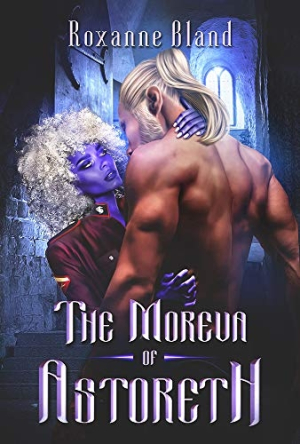The Moreva of Astoreth
The Moreva of Astoreth is a heartrending romantic fantasy novel in which love proves to be a bridge across cultures.
In Roxanne Bland’s layered fantasy novel The Moreva of Astoreth, a down-on-her-luck love goddess learns about the power of resistance.
It’s tough being the granddaughter of a love goddess, as Moreva Tehi well knows. Tehi is a rebellious godling who—after she ignores the rules, loses track of time, and forgets to attend an important ritual—is banished to a kingdom outpost to serve her penance among the Mjoran people. Most of the book’s action takes place there––a foreboding place with cold stone buildings and snow tunnels.
Astoreth and the Mjorans have come to a strained truce following years of war. The Mjorans’ feudal society appears to rely on herbal remedies to cure diseases; it has its own rituals and gods. It is also denied access to the power and might of Astoreth. But there are tantalizing hints that the Mjorans have more technology than outsiders know, and that they are part of a far older culture than Tehi’s scriptures describes.
Tehi’s work involves meeting the spiritual sexual needs of her countrymen while seeking to pacify the locals; she is not to cause the tense political situation to further degrade. She doesn’t take the posting seriously, though. She tempts fate by bringing a sample of a terrible virus along with her; she hopes to find a cure in her portable lab. Her efforts require her to reach out to Hyme, a local healer, for help.
Still, it’s Tehi’s inability to curb her emotions that end up being the real problem: Astoreth’s strict scriptures forbid her from forming a loving bond, on pain of death. Nonethless, she falls for Laerd Teger, the Mjoran village chief, sparking an illicit and dangerous love affair that increases the novel’s tension. The pair explores the dangerous outpost surroundings, which are filled with terrible beasts and spies who seek to undo the fragile truce by exposing their affair.
The novel includes some some light BDSM, as when Tehi whips people with a crop as punishment for their sins during worship. There are implied orgies, too, but there’s nothing graphic in the text itself. Tehi is a larger source of fascination: she knows a lot about the finer points of sex, but nothing about love. She grows to learn the value of caring for others, and finds meaning in the connections that she forms.
In the book’s last third, a story line about addiction is introduced; it ends up feeling superfluous to the larger story. More compelling is the fact that Tehi is willing to risk everything for Teger; she comes to better understand her world and her place in it by the book’s satisfying end.
The Moreva of Astoreth is a heartrending romantic fantasy novel in which love proves to be a bridge across cultures.
Reviewed by
Jeremiah Rood
Disclosure: This article is not an endorsement, but a review. The publisher of this book provided free copies of the book and paid a small fee to have their book reviewed by a professional reviewer. Foreword Reviews and Clarion Reviews make no guarantee that the publisher will receive a positive review. Foreword Magazine, Inc. is disclosing this in accordance with the Federal Trade Commission’s 16 CFR, Part 255.

